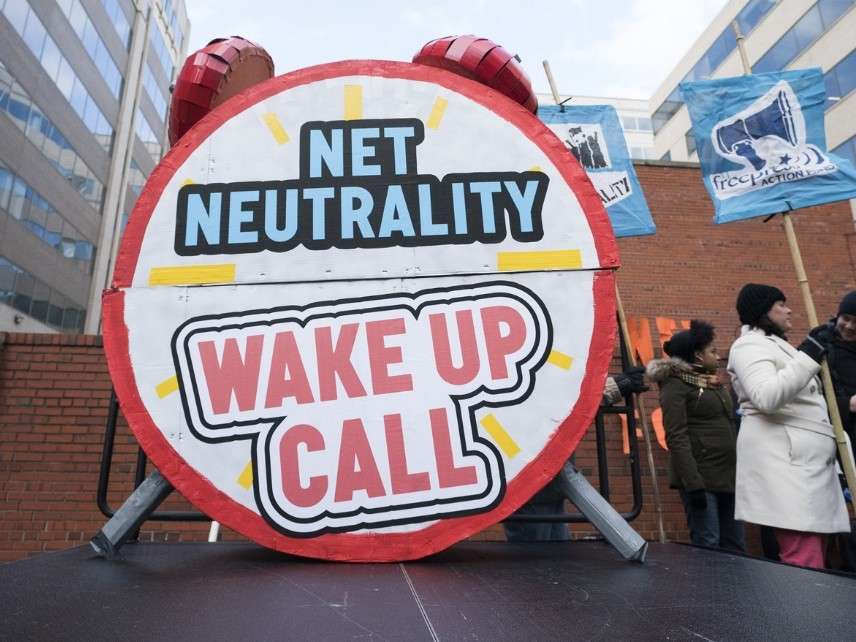The Internet Doesn't Need Saving
But that might not stop House Democrats from Net Neutrality-related histrionics.

When Republicans controlled the U.S. House of Representatives, they approved plenty of proposals that were, charitably, unlikely to become law. Obamacare's repeal was ritually advanced dozens of times. Concealed carry reciprocity for handgun owners cleared the House, but opposition from Democrats opposed to Americans' constitutional right to self-defense doomed it in the Senate.
In 2019, it's the Democrats' turn. A vote is scheduled Tuesday morning before a House committee on a proposal to impose Net Neutrality regulations on internet service providers. It's a lead-up to a planned House floor vote tentatively set for the week of April 8.
The bill, H.R. 1644, is grandly titled the "Save the Internet Act of 2019." The problem, of course, is that the internet seems to be sputtering along—even with plastic straw emoji bans, politicians Instagramming their dental visits, and progressive tears over the Mueller report—about as well as it has for decades. That's despite the lack of Net Neutrality rules imposed by bureaucratic fiat and monitored for violations by federal bureaucrats.
Democrats' response has been to double down on apocalyptic rhetoric. Rep. Frank Pallone, Jr. (D-N.J.), chairman of the Energy and Commerce Committee, recently warned that the lack of Net Neutrality regulations could make it "harder to find a job, harder to get the training [Americans] need, and harder for their kids to keep up at school." A bike store in Asbury Park, New Jersey, Pallone suggested, without giving details, could somehow be "blocked from reaching their customers."
At a press conference, House Speaker Nancy Pelosi (D–Calif.) went so far as to proclaim that "supporting this bill means supporting our democracy."
It's been well over a year since the Trump administration ditched Net Neutrality rules, and no democracy-endangering, bike shop-blocking internet apocalypse has materialized. Instead, over the next year, according to speed test company Ookla's statistics, broadband download speeds rose 36 percent and upload speeds increased by 22 percent. Wireless prices per gigabyte have dropped.
Unfortunately, this is unlikely to sway proponents of Net Neutrality regulations: the topic has become almost as sharply partisan as abortion, Obamacare, or that "big, beautiful wall" along the border with Mexico.
As far back as 2014, Donald Trump was calling Net Neutrality an "attack on the Internet" and a "top down power grab" designed to target conservative voices. Then, under President Obama, the Federal Communications Commission (FCC) imposed Net Neutrality regulations on the internet by a 3-2 party line vote in 2015.
As Democrats discovered to their dismay, federal regulations imposed by a party line vote can be eliminated the same way. That happened after Trump won the presidency in 2016 and the FCC commissioners flipped to a Republican majority. In 2017, the FCC voted 3-2 to return to its policy, dating back to the Clinton administration, of taking a hands-off approach toward regulating broadband providers.
"Even though the FCC couldn't find any evidence of market failure, it turned its back on almost two decades of success," FCC chairman Ajit Pai said at the time. "It imposed upon all Internet service providers, big and small, the heavy-handed regulatory framework designed during the Roosevelt administration to micromanage the AT&T telephone monopoly."
Last October, the Trump administration's Justice Department went even further, and sued California to block a state Net Neutrality law from taking effect.
Broadband providers like AT&T and Comcast may, eventually, censor or block political speech or engage in other miscellaneous skulduggery. If that happens, the Federal Trade Commission already has the authority to put a stop to it. Plus, Pelosi and her progressive activist group allies are sure to highlight any wrongdoing. New Jersey bike shops have little to worry about.


Show Comments (73)